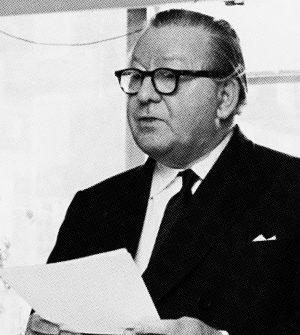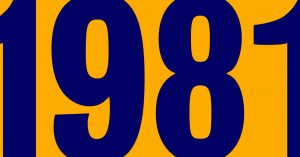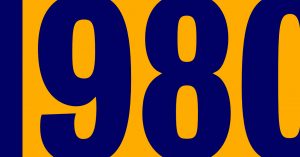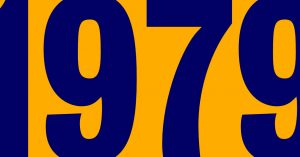ATV financial results: 1963
Sir Robert Renwick on Associated Television Limited’s 1963 results

REASONS FOR DECLINE IN PROFITS
LEVY ON TURNOVER A DISTORTION OF TAXATION PRINCIPLE
GOOD NEWS REGARDING SECOND INDEPENDENT CHANNEL
SIR ROBERT RENWICK ON EFFECT OF NEW AGREEMENTS
The 8th annual general meeting of Associated Television Limited will be held on 26th August, 1963, at 12 noon at ATV House, Great Cumberland Place. London W.1
The following is the statement of the chairman. Sir Robert Renwick, Bt., B.E. circulated with the report and accounts for eleven months ended 31st March, 1963:-
Your Directors decided that it was in the interest of the Company to change its year-end date from 30th April to 31st March and the Accounts now before you are, therefore, for a period of eleven months to 31st March, 1963.
You will see from the Consolidated Profit and Loss Account that the profit of the Group before taxation is £3,405,714 [£59.1m in today’s money allowing for inflation – Ed] for the eleven months as compared with £5,038,204 [£87.5m] for the previous twelve months. This profit is after charging all expenses including depreciation. Taxation based on the profit for the period amounts to £1,556,005 [£27m] and, after making allowance for this and for the interests of outside shareholders, there is left a profit of £1,860,135 [£32.3m] attributable to ATV
The amount retained in subsidiary companies is £249,706 [£4.3m] leaving £1,610,429 [£28m]. Arising from the change in the Parent Company’s year-end date, certain provisions for taxation, made in previous years, amounting £1,546,000 [£26.8m] are no longer required and, together with the unappropriated balance brought forward from last year of £2,424,909 [£42m], make available for appropriation now an amount of £5,581,338 [£96.9m].
An interim dividend of 20% has already been paid and your Directors now recommend a final dividend of 21.25% making a total of 41.25% for the eleven months. This is equivalent to 45% for the full year as against 60% paid in respect of the year to 30th April, 1962. If this recommendation is approved and after transferring a further £500,000 [£8.7m] to Investment Reserve there will be left a balance of £3,906,486 [£67.8m] in the Accounts of the Parent Company.
Balance Sheet Items
Turning to the Consolidated Balance Sheet it will be noted that the Investment Reserve has been used to offset the Goodwill arising on consolidation. Current Assets have increased during the period by £518,077 [£9m] to £8,558,556 [£149m] whereas Current Liabilities have decreased by £816,170 [£14.2m] to £7,440,500 [£129.2m]. It will be noted, however, that Advances from Bankers have increased by £1,781,020 [£30.9m] to £3,018,618 [£52.4m]; this is in the main due to increased investment in the Group’s Fixed and Current Assets and the payment of an exceptionally heavy taxation liability in respect of the financial year 1960/61.
In deciding to change the year-end date from 30th April to 31st March, your Board recognised that this would inevitably mean the exclusion of the profit deriving from one of the more remunerative months in the calendar. Had the trading results for April been included, the profit figures would have been substantially higher.
A decline in profits would nevertheless have been revealed. This decline is due to a variety of causes. In the first place, there has been a drop in revenue from advertising of approximately 5%. Secondly, certain of the subsidiary companies have, as anticipated, made losses in the early stages of their development. Thirdly, the Company was feeling the full effects of the new agreements with Equity and the Musicians’ Union and, to a lesser extent, of a new agreement with the Variety Artistes’ Federation. Some indication of the increases which the Company had to meet in programme expenditure may be gauged by citing a few examples. The settlement with Equity on which work was resumed on 6th April, 1962, provided a new minimum fee for an actor on a networked programme of 36 guineas [£37.80 in decimal, £656 with inflation]; the old fee was 10 guineas [£10.50/£182]. The settlement with the Variety Artistes Federation reached on 17th November, 1961, provided for a new minimum fee of £30 [£521] for a networked programme as against 10 guineas: the settlement with the Musicians’ Union reached on 10th April, 1962, gave a minimum fee of £18 [£312] for a networked programme as against £6 [£104] under the previous arrangement.
Transdiffusion analysis
Whilst the vast bulk of the Pilkington Report was, rightly, ignored for being completely unworkable in practice, enough of the spirit behind it remained to trouble ITV in general and ATV in particular.
From the point of view of politicians, who being in London only saw the output of ATV’s weekend service and could only contrast it with A-R’s more sober offerings on weekdays, ATV was making a lot of money for doing very little. For the press, it was a stick to beat ITV with, since they were in direct competition for advertising revenue and indirect competition for news and editorial. ATV, in particular, made a good target because a substantial slice of the company was owned by the Daily Mirror, a socialist newspaper in a print market dominated by Conservative-supporting press barons. Attacking ATV therefore suited everybody – politicians could say they were concerned about their constituents’ educational and social needs; the government could raise money from it without raising taxation on individuals; the Tory press could undermine both Britain’s most popular newspaper, the Daily Mirror, and somehow point to ATV as being symptomatic of how bad a Labour government would be; and the great and the good could bemoan how terrible things like the Palladium show were from their lofty positions on BBCtv and Third Programme discussion programmes.
In the end, it all boiled down to three facts: there would be no ITV-2; the BBC would get a second, upmarket, channel as a way of helping them to compete with ITV; and the excess profits of ITV in general and ATV in particular could be syphoned out and put to better uses.
How to implement that latter one, though? Of the Big 4, ATV was unusual. The other three companies were subsidiaries of larger companies. ABC was part of the second largest cinema chain. Granada was part of a growing leisure combine. A-R was a small part of the massive industrial combine British Electric Traction. All three had expanded into related business, using the profits from ITV to pay for them. But each new venture was a fellow-subsidiary of the bigger group above it. Only ATV was first and foremost an ITV company, and its diversifications were subsidiaries of that ITV company, not of an overall group.
If the Chancellor wanted to raid ITV to grab a share of the profits – and he very much did – then three of the Big 4 would be protected, as the money would come from the ITV subsidiary rather than the group. But for ATV, the Chancellor would be reaching directly into the pockets of not only ATV but also ITC, Stoll, Pye Records, British Relay, bowling alleys and piped music.
The original plan was for the government just to help itself to a share of the profits (this part was definitely an attack on ATV itself). The amount of lobbying ATV had to do to stop this was tremendous. Having sat with nothing to do since the rise of Lew Grade, the previously sidelined Norman Collins was given the job of pressing flesh, writing newspaper articles, schmoozing cabinet ministers and generally lobbying loudly wherever the opportunity presented. It worked.
The new Levy was to be taken from money made from advertising instead of general revenue. However, there was a wrinkle. Fearful of how companies might silo the advertising money or raise advertising rates to pay for it, the Levy was raised on turnover: the money as it came in through the door, before it was processed or apportioned. That this would fall hardest on the two companies with two regions – ATV and ABC – was a side effect but, in the case of ATV, one the government didn’t really mind.
Threat of the Television Bill
Historically, the year 1962/63 will be remembered by your Board as one of many and major preoccupations, chiefly concerned with the future of Independent Television in general and with the future of this Company in particular.
In June, 1962, the Report of the Pilkington Committee, which was appointed in July, 1960, was at last published. This Report, which proved to be hostile towards Independent Television as a whole, recommended the total abolition of the system as we know it to-day and the substitution for it of a system whereby the Independent Television Authority was to plan the programmes, arrange for their networking and for the selling of the advertising time – leaving Companies, such at ATV, to play the role merely of programme suppliers to a Government Authority.
It is to the credit of the Government that the main recommendations of the Pilkington Report were rejected. Nevertheless, when, on 20th December, 1962, the Postmaster-General presented his Television Bill it was immediately apparent that the atmosphere Pilkington was still pervasive. For, although it was recommended that the Programme Companies should continue as full operators of the television service in their various areas, it was laid down in the Bill that the Authority should be able to specify not only which programmes should be networked but at what price the originator should be required to supply them.
Nor was this all. The financial provisions in the Bill included a clause empowering the Postmaster-General to impose additional charges on the Programme Companies by way of a tax on profits deriving not only from the operation of a television licence but from the operation of any subsidiary company or companies.
It was because your Board felt that such a discriminatory tax was most improper that we took action. First, I wrote to shareholders warning them of the gravity of the situation; then, on behalf of your Board, I issued a number of statements to the Press; finally, I sought, and obtained, an interview with the Postmaster-General and corresponded with him. Throughout I made it my business to see that Members on both sides of Parliament were informed of the true facts of the situation
I mention these matters because in certain quarters much play has been made of a Television Lobby and the activities of a so-called Television “pressure group”. Those who have been most vociferous in expressing their disapproval have completely ignored the fact that within Independent Television there are nearly as many points of view as there are Companies, and that it was only in respect of certain limited objectives that there was any measure of agreement at all. This state of affairs seems to me healthy. democratic and in the true spirit of free enterprise.
So far as ATV is concerned I would regard it as a total dereliction of my duty as Chairman if, faced by a situation which could obviously be grievously harmful to your Company, I had not exerted every legitimate effort to induce the Government to revise its thinking.
The Board, and shareholders in general, have every reason to be grateful to your Deputy Chairman, Mr. Norman Collins, for the unsparing and untiring work which he devoted to securing improvement in the Television Bill.
An Ill-conceived Levy
Not that our efforts were entirely successful. Quite the contrary, in fact. For on 25th April, 1963, the Postmaster General suddenly withdrew his proposed omnibus tax on profits and substituted for it an arbitrary – and I think thoroughly ill-conceived – levy on turnover. In my view the levy is entirely mis-applied. The purpose of a turnover tax, as it is usually called. is to extract money for the Exchequer at the various stages where profit has accrued in a developing economic process – say between the suppliers of raw materials, the manufacturers, the wholesalers and the retailers. To attempt to apply it to an industry such as Independent Television which has only one operation – the earning money from advertisements to enable it to put out a free service to the public – is clearly a distortion of this taxation principle.
In order to substantiate our case financial statements were made freely available to the Postmaster General and to his colleagues. These statements clearly indicated one thing, viz., that a levy on turnover would affect some Companies far worse than others – your own Company, I regret to say, worst of all.
Why? For the simple and inescapable reason that ATV with its dual and divided seven-day operation in London and the Midlands has two lots of overheads, two lots of studios, two lots of offices, two lots of programme costs and so forth. The revenue – now to be subject to the levy – earned from this dual operation is no larger, and may indeed be smaller, than the revenue earned by a Company operating a five-day service in one area only with one lot of overheads, one lot of studios, one lot of offices, one lot of programme costs and so forth.
The Postmaster General has now said that he will look to the Authority to iron out these inequalities by imposing a system of differential rentals as between the various Companies. It may well prove to be the case, however, that the inequalities are so great that it is only by some measure of re-allocation of days or areas that the Authority will be able to seek to redress the balance.
Competition Achieved
Nevertheless, if your Board has failed in some of its efforts, there is cause for congratulation on one matter of major importance. On 27th June the Postmaster General announced in the House that by 1966, when there should be not fewer than 1½ million television sets in London capable of receiving a new 625-line service in UHF, he would authorise a second Independent Channel in the main areas. That is good news indeed and does much to remove the sourness of a singularly long and frustrating series of negotiations. It represents the culmination of a campaign that your Company alone has fought from the very beginning of Independent Television. Over the years we have repeated in Annual Report after Annual Report that we have never believed that a single Independent Television Service could comply with the basic requirements of the 1954 Television Act that “there is adequate competition to supply programmes between a number of programme contractors independent of each other both as to finance and also to control.” Within a single service the Companies inevitably tend to be complementary rather than competitive. Your own Board, moreover, has always felt that the advertisers. on whom the revenue to support Independent Television depends, should enjoy the freedom of buying in a competitive rather than a monopolistic market.
As the pioneer Company in advocating competition, ATV looks to play its full part over the years in the expanding field of Independent Television.
In the meantime. and for the immediate future. we have concentrated our efforts on making the most effective contribution that can be made in both the areas in which, under the terms of the licence, we are required to provide programmes. The success of London programming at the week-ends will be familiar to all the viewers who live within range of the Croydon transmitter.
4,000,000 Audience in the Midlands
Not that we regard our Midland audience as in any way less important. For those who do not live within the area served by the Lichfield transmitter I should report that for the first time our audiences have topped the four million mark. Many notable figures from all political parties and from all walks of life have appeared in programmes. These have included the Prime Minister, both when he addressed the Birmingham Chamber of Commerce early this year and also when he made his important announcement on leadership only last month at Wolverhampton. In such regional programmes as “Midland Montage”, “Midland Profile”, and “Look Around”. Mr. Iain Macleod and Mr Ernest Marples have appeared; and Miss Jenny Lee and Mr Roy Jenkins have spoken for Labour.
ATV is particularly proud of being the first Company to introduce a regular mid-day programme, and Noele Gordon’s “Lunch Box”, now in its seventh year, is already running into its 1,600th edition. Scarcely less important is the children’s programme conducted by Jean Morton, “The Tingha and Tucker Club”, which now has an estimated membership of half a million children and is firmly established as the most popular children’s programme in Midland television.
Company’s Multiple Interests
From the earliest days of the Company your Board decided on a policy of diversification. In the result our production subsidiary, Incorporated Television Company Limited, has traded widely throughout the Eastern Hemisphere. ITC Ltd. deals with 42 countries in the Eastern Hemisphere, 21 of them in Europe, nine in the Middle East and North Africa, seven in Australasia and the Far East, and five Commonwealth countries in Africa. ITC Ltd. also deals with the three of the Islands in the British Caribbean which operate a television service.
During the twelve months ended 31st March, 1963, over 5,600 hours were sold in these territories, approximately 4,300 hours being sales of film series, the balance telerecordings and documentary-type programmes.
Sales in these areas in this period amounted to £336,810 [£5.9m], and this is a steadily expanding market.
In the U.S.A., Independent Television Corporation has again shown progress in distributing our productions in the Western Hemisphere. Though trading conditions have been difficult within the USA. this Company since its inception has brought not less than $12 million [$119.3m] into this country.
“Fireball XL5”, beginning in the autumn, has been taken for showing on one of the principal American networks, while both “The Saint” and “Broadway Goes Latin” are being sold for syndication.
In partnership with the National Broadcasting Corporation of America and Herbert Brodkin, we are producing twenty-six one-hour episodes of “Espionage” in England. Our Group has world-wide distribution rights in this series outside the U.S.A. The series is to be shown on the N.B.C. Network as well as by our Company in the U.K. and has already been sold for transmission in Australia, Canada and Japan. The production on film of any television series necessitates considerable expenditure which can be recovered only over a period of years and provided a satisfactory sale can be secured in the U.S.A. Not the least of the reasons for deprecating the new levy on turnover is the fact that less money will be available for the production of film series which are vitally important both for home use and for export.
I am happy to say that Australia has emerged from its recession to which I referred last year and the results from our group investments in Australia have once again produced better figures. Our investment in Canada is also making satisfactory progress.
The build-up of our background music service, Muzak, is continuing slowly but steadily. It will be appreciated, however, that inevitably heavy investment in the development of this type of service will take some time before it can be fully recovered and the Company be made profit-making.
In the last eighteen months we have taken the first steps to set up and operate a chain of tenpin bowling centres. Our wholly owned subsidiary, Ambassador Bowling Limited, now has two centres in operation and a further three or four will be in operation in the course of the next twelve months. It is already apparent that tenpin bowling is a sport which has found considerable favour in this country and I am sure that this new venture of ours will prove remunerative over the years.
Pye Records Limited, in which your Company has a 50% holding, continues to make excellent progress and with the advent of its up-to-date recording studios will, I am confident, continue to expand.
As to our large investment in British Relay Wireless and Television, as shareholders will appreciate from the figures recently produced by that Company, it is progressing well.
Top Management
During the year under review,. your Company has seen major changes in top management. Mr. Val Parnell, who has acted as your Managing Director from the inception of the Company, retired at his own request. The services which he rendered during the formative years of the Company cannot be over-valued and we are delighted that he has agreed to remain on the Board and to act in a general advisory capacity, in addition to remaining responsible for one of the most popular programmes on Independent Television, “Val Parnell’s Sunday Night at the London Palladium”. Your Board was fortunate in having his successor so close at hand. Mr. Lew Grade, who over the years has acted as Mr. Parnell’s deputy, was immediately appointed to the top post. Mr. Grade’s appointment has proved to be universally popular throughout the industry and has been widely acclaimed by the Press. The Board regards itself as equally fortunate in obtaining the services as deputy to Mr. Grade of Mr. Edward J. Roth who, prior to joining your Company, was Director-General of Radio Eireann.
In the general context of Independent broadcasting as a whole I am happy that the date of this Annual Report makes it possible for me to be the first to express the feelings of the industry as a whole in welcoming the Rt. Hon. Dr. Charles Hill, now Lord Hill of Luton, as the new Chairman of the Authority. In doing so most warmly I will take this opportunity of thanking Sir John Carmichael who has acted Chairman since the retirement last November of Sir Ivone Kirkpatrick. Independent Television has never felt that it has had a wiser counsellor than Sir John. Once again I would like to express the appreciation of ATV to the Director-General of the ITA, Sir Robert Fraser, and to his colleagues within the Authority.
And now a word of tribute to our staff in London, Birmingham and elsewhere the world over. Despite the cloud of political uncertainties which has hung over the industry every member of ATV’s staff has worked most loyally throughout the year and the Board wishes to express its keen appreciation.
About the author
As a public company with shareholders, ATV was required to publish a detailed Annual Report at the end of each financial year. It was common to also publish a Chairman's Statement, summing up the report in more readable language.





